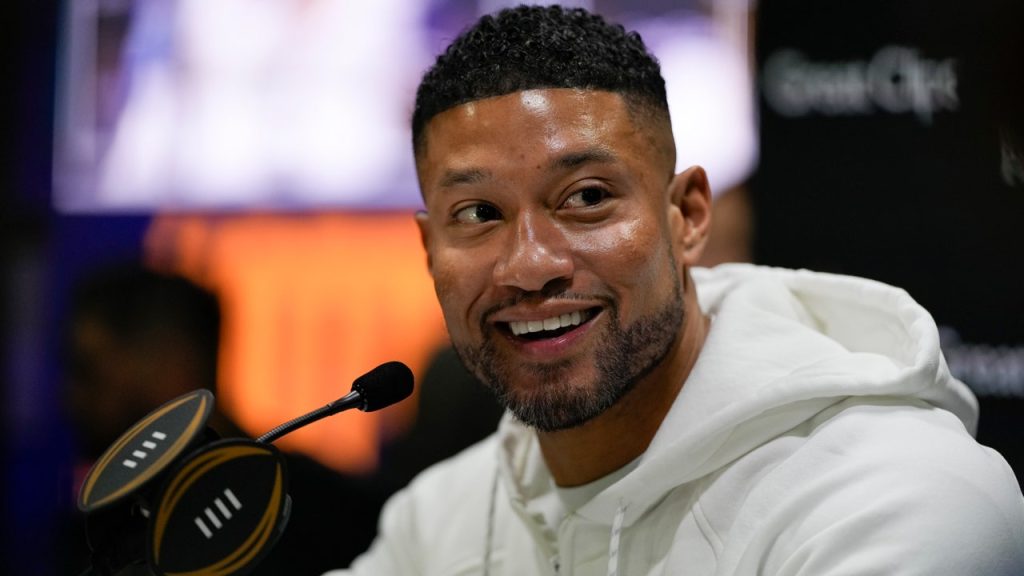Marcus Freeman, the head football coach at the University of Notre Dame, is on a mission to bring the Fighting Irish their first national championship title since 1988. His journey, both personal and professional, has been profoundly shaped by his faith, a journey that led him to convert to Catholicism during his tenure at the iconic university. Freeman’s emphasis on faith, shared by many of his players, has become a defining characteristic of the team’s culture as they prepare for the ultimate test on the gridiron. This spiritual dimension adds another layer of intrigue to Notre Dame’s quest for glory, harkening back to a tradition deeply intertwined with the institution’s identity.
Freeman’s path to Notre Dame began as the defensive coordinator under Brian Kelly. When Kelly departed for LSU, Freeman faced a pivotal decision. He chose to remain at Notre Dame, a decision that would ultimately lead him to the head coaching position and a deeper connection to the university’s Catholic heritage. Upon assuming the head coaching role, Freeman swiftly reinstated the tradition of pregame Mass, a practice that had resonated with him even before his own conversion. He recalled witnessing the team emerging from the basilica during his high school years, a powerful image that stuck with him. The restoration of this ritual signified not only a return to tradition but also Freeman’s burgeoning personal faith journey.
Freeman’s conversion to Catholicism was a significant milestone. Raised a Christian, he found himself drawn to the Catholic faith during his time at Notre Dame, a place where spiritual growth is actively encouraged. The university’s environment, coupled with the guidance of the team chaplain, Father Nate Wills, facilitated Freeman’s conversion. He was baptized and received his first Holy Communion at St. Pius X Catholic Church in Granger, Indiana, formally embracing the faith that would become integral to his life and leadership. This personal transformation adds a compelling dimension to Freeman’s coaching narrative.
The importance of faith extends beyond Freeman himself, permeating the team’s culture. Players actively participate in Bible study, and faith is openly discussed and embraced. This shared spiritual foundation fosters a sense of unity and purpose, providing a framework for navigating the pressures of high-stakes college football. Quarterback Riley Leonard, a transfer student, embodies this faith-driven approach. Leonard believes his arrival at Notre Dame was divinely ordained, recounting his prayers for guidance and the subsequent offer from the university. He views Freeman as a humble leader who doesn’t shy away from his faith, setting a powerful example for the team.
Freeman’s emphasis on faith resonates with the broader Notre Dame tradition. The university’s motto, “God, Country, Notre Dame,” encapsulates the intertwined nature of these three pillars in the institution’s identity. The pregame Masses held at the Basilica of the Sacred Heart, with its inscription, “God, Country, Notre Dame, In Glory Everlasting,” serve as a tangible reminder of this deeply rooted connection between faith and football. Freeman’s leadership seeks to revive and strengthen this connection, creating a unique atmosphere within the program.
As Freeman leads the Fighting Irish into the national championship game, the interplay of faith and football takes center stage. His journey, from defensive coordinator to Catholic convert to head coach, underscores the transformative power of faith. The team’s shared spiritual foundation, fostered by Freeman’s example, adds a unique dimension to their pursuit of a championship title. Their success, both on and off the field, is viewed through the lens of faith, offering a compelling narrative that transcends the sport itself. The upcoming game is not merely a contest for a trophy; it’s a testament to the enduring influence of faith within the storied Notre Dame football program.

